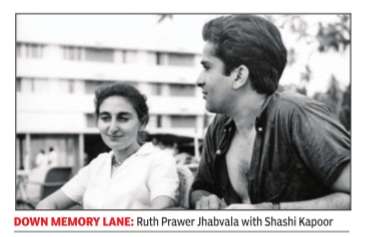Ruth Prawer Jhabvala
A tribute to Ruth Prawer Jhabvala
This is a collection of articles archived for the excellence of their content. |
Avijit Ghosh, December 10, 2014
First she wrote by hand; the warped, barely legible alphabets on the notebooks would resemble a cryptic code. Once through, she would diligently type out the manuscript on a sturdy Erica, a portable German typewriter of the 1940s. By the mid-1990s, author and screenplay writer Ruth Prawer Jhabvala had graduated to a laptop. But her beloved typewriter, still in remarkably good health, is on view at an ongoing exhibition focused on her life and works. Also on display at the India International Centre is the handwritten draft of her screenplay of Mr and Mrs Bridge, where the husband-wife team of Paul Newman and Joanne Woodward played the lead roles.
“After she passed away last year, we always wanted to do a tribute like this for her,“ says her daughter Renana Jhabvala, who put together the exhibition `Her Three Continents' with curator and documentary filmmaker Meera Dewan. The exhibition is on till December 18.
There's also a seven-film retrospective, including a rare public viewing of Shakespeare Wallah (1965) and a discussion on her art and craft during the exhibition at India Habitat Centre.
Of German-Jewish origin, Ruth was born in Germany and spent her teenage years in England before moving to India after her marriage to architect Cyrus Jhabvala in 1951. “They met at a party on the day my father, training to become an architect in London, had booked his ticket back to India. They connected immediately. When he went back two years later, they got married. She was 24,” remembers Renana, an eminent social activist.
In 1975, the writer moved to New York although she kept coming back to India every year. “In her mind, she lived in three continents, hence, the title of the exhibition.
Ruth is the only individual to win both Booker Prize and the Oscar. She claimed the Booker in 1975 for Heat and Dust, a tale of cross-cultural coveting set in colonial India. British writer Caryl Phillips was quoted in The Guardian newspaper saying, “She understood loss of language, land and history in a brutal and visceral way , reinvented herself, first in the heart of an old empire, then in the cradle of a newly independent country , and now in the centre of the new American empire.“
Ruth's two Academy Awards came for her screenplays of E M Forster's A Room with a View and Howard's End. For Kazuo Ishiguro's Remains of the Day , she earned a nomination.
Every weekday from 9.30 in the morning to 1pm, recalls Renana, her mother would ritually sit before her writing table, designed by her husband, overlooking a prosperous neem tree at their Civil Lines home. The rigour and discipline enabled her to produce a substantial body of work: a dozen novels, eight short stories collections and over 20 screenplays.
An overwhelming majority of her screenplays were for Merchant-Ivory films. Ruth formed the third angle in this unlikely trio. Her collaboration with director James Ivory and producer Ismail Merchant is marked for its durability and the quality of their harvest. They were the original `Indie' of world cinema; much before the term became fashionable.
Not many know Ruth's father committed suicide after coming to know that many of his family members had been killed in the Holocaust. “She never spoke a word about her life in Germany. We know that she went to school wearing a yellow star identifying the Jews. Only once she told me, I don't want to step my foot there because the walls still smell of blood”. In an increasingly polarized India that statement sounds like an advance warning.
